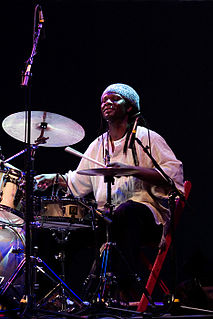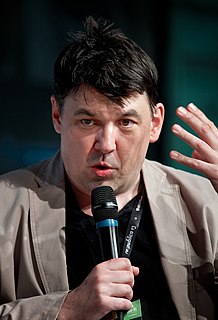A Quote by Andrew Haigh
I think all of my male characters, I suppose, in all of my films, they're not necessarily the traditional version of masculinity.
Quote Topics
Related Quotes
What we're seeing now is not just a backlash against feminism. When you look at guys like [Jesse] Helms in the '80s or even Reagan and Bush, there was a real political backlash against feminism. This is different. This is a parodic recreation of the destruction of traditional masculinity. Look at these hollow men. Look at Steve Bannon who wears sweat pants, who doesn't shave. Or Yiannopoulos who is just a clown. This is toxic masculinity. It's new. To see it as a return to the past is a mistake. It's the breakdown of traditional masculinity, rather than its retrenchment.
Femininity doesn't always relate to being a woman and masculinity doesn't always relate to being a man; it's a quality of being-ness. Women have to portray the quality of masculinity; society wants it to be like a man; not necessarily male, but like a man. If that makes sense...In nature itself, there's yin and yang, there's masculine and feminine.
It's a fact, the majority of films in Hollywood are from the male perspective. And the female characters, very rarely do they get to speak to another female character in a movie, and when they do it's usually about a guy, not anything else. So they're very male-centric, Hollywood films, in general. So I think it's incredible that Ned Benson, when I said I'd love to know where she goes, says okay, I'm going to write another film from the female perspective.
The bonding of women that is woman-loving, or Gyn/affection, is very different from male bonding. Male bonding has been the glue of male dominance. It has been based upon recognition of the difference men see between themselves and women, and is a form of the behaviour, masculinity, that creates and maintains male power… Male comradeship/bonding depends upon energy drained from women.
As a guy develops and practices his masculinity, he is accompanied by an invisible male chorus of all the other guys, who hiss orcheer as he attempts to approximate the masculine ideal, who push him to sacrifice more of his humanity for the sake of his masculinity, and who ridicule him when he holds back. The chorus is made up of all the guy's comrades and rivals, his buddies and bosses, his male ancestors and his male cultural heroes--and above all, his father, who may have been a real person in his life, or may have existed only as the myth of the man who got away.
One thing you can say about Trump is that he is not a traditional patriarch. He has a wife who's not even in the White House. And you could say the same of Duterte in the Philippines and of Putin. They're parodies of masculinity. They're hyper-masculine, but they're also totally unsure of their masculinity, and they parade it around.



































